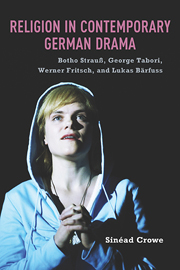
- Publisher:
- Boydell & Brewer
- Online publication date:
- May 2013
- Print publication year:
- 2013
- Online ISBN:
- 9781571138446

Critics often claim that the twenty-first century has seen a sudden "return" of religion to the German stage. But although drama scholarship has largely focused on politics, postmodernity, gender, ethnicity, and "postdramatic" performance, religious themes, forms, and motifs have been a topic and a source of inspiration for German dramatists for several decades, as this study shows. Focusing on works by four major dramatists - Botho Strauß, George Tabori, Werner Fritsch, and Lukas Bärfuss - this book examines how, why, and to what effect religion is invoked in German drama since the late 1970s. It asks whether contemporary German drama succeeds in developing religious insights or is at most quasi-religious, exploiting religious signs for aesthetic, theatrical, or dramaturgical ends. It considers the performative and historical intersections between drama and religion, contextualizing the playwrights' treatments of religion by exploring how they lean on or repudiate the traditions of modern European drama, especially that of Strindberg, the Expressionists, Artaud, Grotowski, and Beckett. It also draws on the sociology, anthropology, and psychology of religion, exploring how these works reflect the changing place of religion and spirituality in the world, from secularization to the "alternative" modes of religiosity that have proliferated in Western society since the 1960s. Sinéad Crowe is a Teaching Assistant at the University of Limerick, Ireland.
 Loading metrics...
Loading metrics...
* Views captured on Cambridge Core between #date#. This data will be updated every 24 hours.
Usage data cannot currently be displayed.